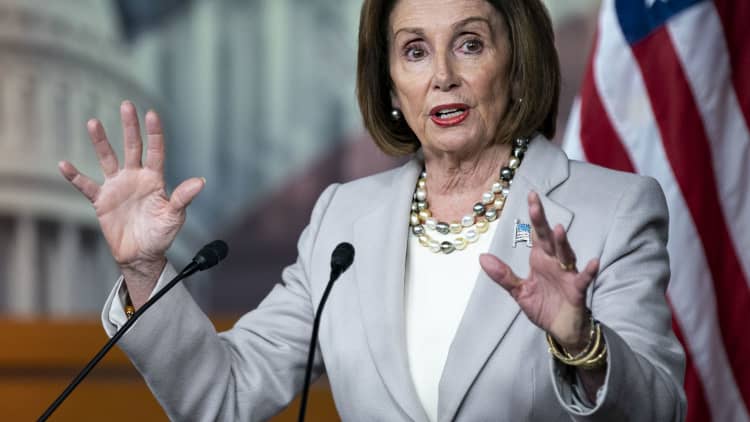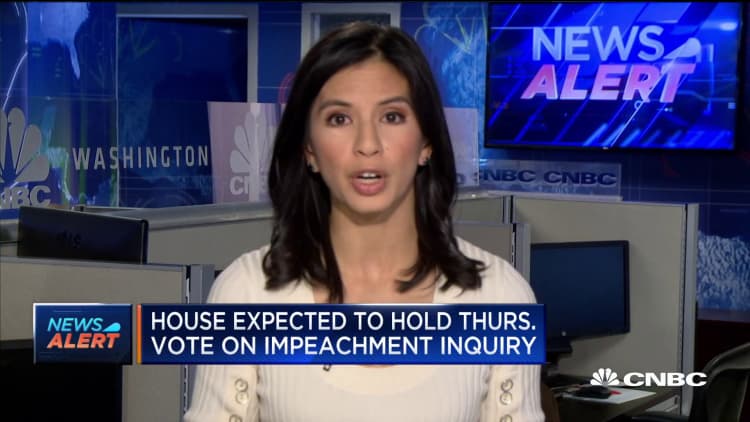
House Democrats on Tuesday released the text of a resolution outlining guidelines for conducting the impeachment probe into President Donald Trump.
The eight-page resolution, submitted Tuesday by Rules Committee Chairman James McGovern, D-Mass., directs Democrat-led House panels to "continue their ongoing investigations" as part of the inquiry into "whether sufficient grounds exist for the House of Representatives to exercise its Constitutional power to impeach" Trump.
Read the full resolution here, or scroll down to read the Rules Committee's fact sheet.
House Speaker Nancy Pelosi, D-Calif., said Monday that the House would vote this week on the resolution. The vote is expected Thursday.

The document appears to expand the scope of the inquiry by allowing the House Judiciary Committee to "conduct proceedings related to the inquiry." Until now, the Intelligence, Oversight and Foreign Affairs committees have been the leading panels on the probe.
The resolution also delegates various powers to Intelligence Chairman Adam Schiff, D-Calif., including the powers to "designate an open hearing or hearings."
A White House official, who declined to be named, told CNBC, "This is a sham."
That official said that a fact sheet provided by the Rules Committee claims to give Trump "opportunities to participate." But "the explicit participation for the White House laid out in the fact sheet is not in the resolution," the official claimed.
However, the text of the resolution says that the Judiciary Committee is authorized to conduct impeachment proceedings, "including such procedures as to allow for the participation of the President and his counsel."
Schiff released a joint statement with Judiciary Chairman Jerrold Nadler, Foreign Affairs Chairman Eliot Engel and Oversight acting Chairwoman Carolyn Maloney shortly after the resolution was made public.
"The House impeachment inquiry has collected extensive evidence and testimony, and soon the American people will hear from witnesses in an open setting. The resolution introduced today in the House Rules Committee will provide that pathway forward," the Democratic committee chairs said.
"The evidence we have already collected paints the picture of a President who abused his power by using multiple levers of government to press a foreign country to interfere in the 2020 election," they said in the statement. "Following in the footsteps of previous impeachment inquiries, the next phase will move from closed depositions to open hearings where the American people will learn firsthand about the President's misconduct."
Since Pelosi announced the impeachment inquiry last month, Republicans have complained that Democrats had not held a formal vote to authorize the probe.
Pelosi had shrugged off those complaints about the process — which have grown more intense in recent weeks — accusing Republicans of trying to distract the public from the alleged abuse of power by Trump.
But the move to hold a vote on the impeachment proceedings in the House was also met with criticism from GOP leaders and other allies of the president.
Rep. Jim Jordan, R-Ohio, the Oversight committee's ranking member, tweeted, "Codifying a sham process halfway through doesn't make it any less of a sham process."
Trump shared Jordan's tweet, along with nearly three-dozen others, in a Tuesday morning social media frenzy. The fusillade was launched as Lt. Col. Alexander Vindman, a Ukraine expert on the National Security Council, came to Capitol Hill to testify that he was a firsthand witness to Trump's July 25 call with Ukraine President Volodymyr Zelensky.
Vindman's opening statement said that Trump's request for Ukraine to "look into" former Vice President Joe Biden and his son so alarmed Vindman that he reported it to a superior.
Read the Rules Committee's fact sheet on the impeachment guidelines resolution below:
Reaffirms the ongoing impeachment inquiry.
• The resolution makes clear that the investigating committees have been engaged in an
impeachment inquiry and directs them to continue their vital work.
Ensures transparency.
• The resolution authorizes HPSCI to make transcripts of their recent depositions public
with appropriate redactions be made for classified or other sensitive information.
• The resolution establishes procedures for all investigating committees to transmit their
evidence to the Committee on the Judiciary for use in their proceedings.
Enables effective public hearings.
• The resolution permits staff counsels to follow their lines of inquiry to their ends by
allowing for periods of up to 45 minutes per side in the questioning of witnesses.
o This approach builds on the precedent of having staff counsels conduct initial
questioning, followed by Member questions, that Republicans set for the
questioning of Independent Counsel Kenneth Starr in 1998.
• The resolution also continues the precedent of giving the minority the same rights to
question witnesses that the majority has, as has been true at every step of the inquiry.
Provides the President opportunities to participate.
• The resolution establishes opportunities for the President or his counsel to participate in
impeachment proceedings held by the Committee on the Judiciary, including to:
o Present their case and respond to evidence;
o Submit written requests for additional testimony or other evidence;
o Attend hearings, including those held in executive session;
o Raise an objection to testimony given; and
o Cross-examine witnesses.
• If the President unlawfully refuses to cooperate with Congressional requests, the Chair
shall have the discretion to impose appropriate remedies, including by denying specific
requests by the President or his counsel.
Directs the Committee on the Judiciary to review the evidence and, if
necessary, to report Articles of Impeachment to the House.
• Following the precedent of every modern impeachment inquiry, the Committee on the
Judiciary will decide whether Articles shall be reported to the House.
-- CNBC's Eamon Javers contributed to this report.


